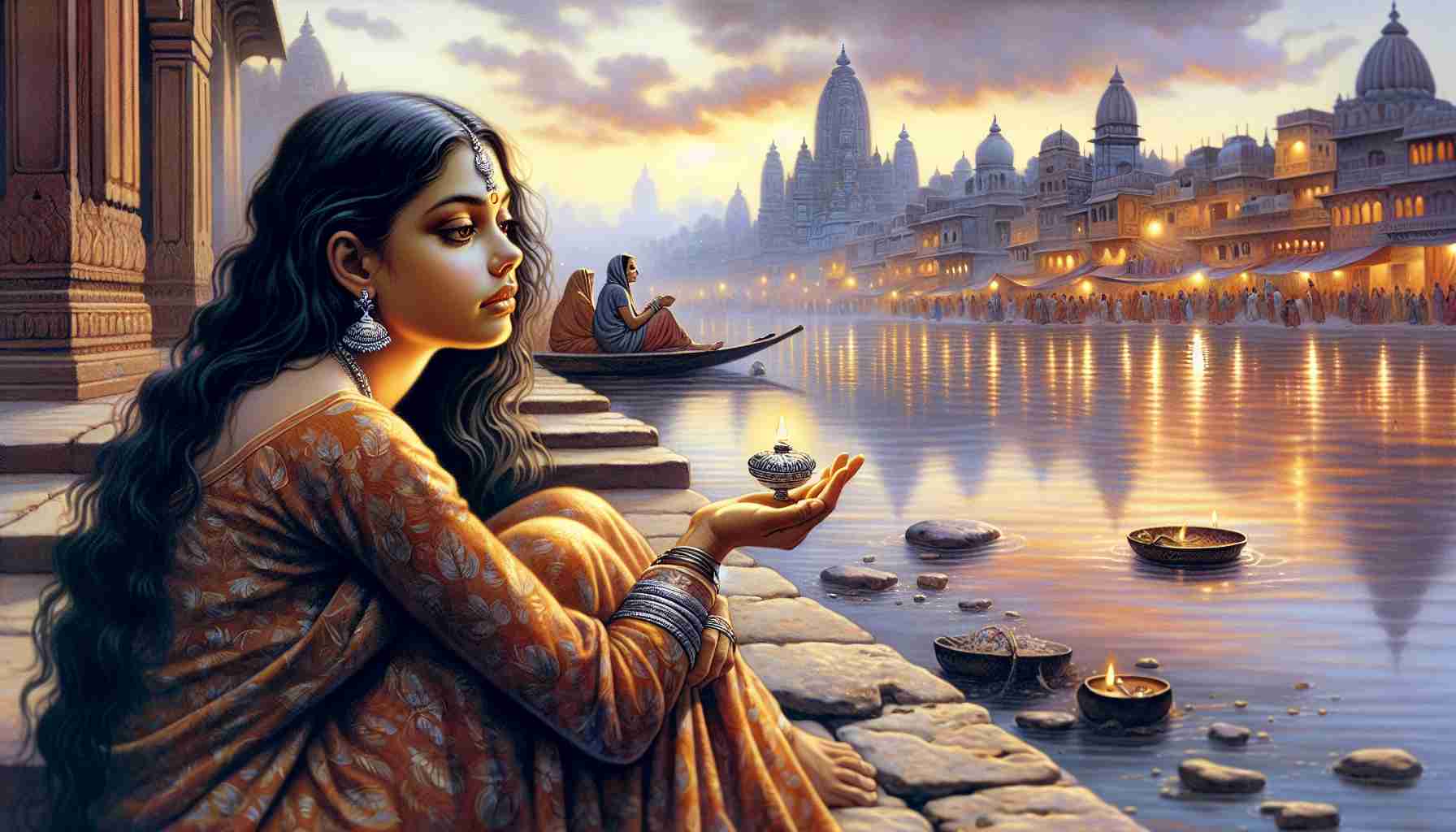

I am Anaya, the youngest daughter of a trader from Varanasi. I remember the day when Appa placed the silver key to our family’s spice shop in my palm. His hands trembled slightly as he said, “It is your time now, Anaya. The shop must continue.” But I didn’t feel ready.
Every fiber of me longed to run — to study in Mumbai, to write poetry. But I also remembered the smell of sandalwood and cardamom on Appa’s kurta, the stories he wove around cinnamon sticks late into the night. The weight of the key in my hand was heavier than I expected.
The day after Appa gave me the key, I walked aimlessly to the banks of the Ganga — our sacred river. I didn’t go seeking answers. I just wanted to breathe. Crowds moved past, but I sat on the cold stone steps, watching a small boy float a diya — an oil lamp — out into the water. He folded his hands tightly. I leaned closer and heard him whisper, “Please help Ma get well.” No more. No less. His eyes were steady.
I looked away, my own heart aching with indecision. What was I even asking for?
Just then, a verse I hadn’t thought of in years surfaced — one Appa taught us as children from the Bhagavad Gita: “Shraddhavan labhate jnanam” — “The one who has faith gains true knowledge” (Gita 4.39).
Faith — that silent thread that ties purpose to the heart — I’d forgotten mine.
I sat there longer, watching the current shift and swirl. Dharma, I’d been told, isn’t always thunder. Sometimes it hums like breeze through temple bells — easy to ignore unless I quieted my own noise.
That evening, I returned to the shop. I unlocked the doors with shaking hands. The air inside held Appa’s essence — turmeric, dried bay leaves, his worn accounts book still on the counter.
Over the next few weeks, I began showing up earlier and staying longer. I started writing poems again — not in Mumbai, but on the back pages of old ledger books, inspired by the stories of women who bought cloves for their sons’ weddings or turmeric for their new daughters-in-law.
Dharma, I realized, isn’t about one perfect path. As Sri Krishna tells Arjuna in the Gita, “Better to fail in one’s own dharma than to succeed in the dharma of another” (Gita 3.35).
My calling wasn’t only literature. It was to bring grace to even small things — weighing saffron, listening to neighbors, honoring Appa’s legacy with my whole, uncertain heart.
Years later, I still write, still sell spices. And when I’m unsure again — because life keeps offering new forks in the road — I return to the river. Not always for answers. But to remember that Dharma doesn’t shout.
It whispers. Just like it did that day, through a child’s prayer and the Ganga’s gentle song.
I am Anaya, the youngest daughter of a trader from Varanasi. I remember the day when Appa placed the silver key to our family’s spice shop in my palm. His hands trembled slightly as he said, “It is your time now, Anaya. The shop must continue.” But I didn’t feel ready.
Every fiber of me longed to run — to study in Mumbai, to write poetry. But I also remembered the smell of sandalwood and cardamom on Appa’s kurta, the stories he wove around cinnamon sticks late into the night. The weight of the key in my hand was heavier than I expected.
The day after Appa gave me the key, I walked aimlessly to the banks of the Ganga — our sacred river. I didn’t go seeking answers. I just wanted to breathe. Crowds moved past, but I sat on the cold stone steps, watching a small boy float a diya — an oil lamp — out into the water. He folded his hands tightly. I leaned closer and heard him whisper, “Please help Ma get well.” No more. No less. His eyes were steady.
I looked away, my own heart aching with indecision. What was I even asking for?
Just then, a verse I hadn’t thought of in years surfaced — one Appa taught us as children from the Bhagavad Gita: “Shraddhavan labhate jnanam” — “The one who has faith gains true knowledge” (Gita 4.39).
Faith — that silent thread that ties purpose to the heart — I’d forgotten mine.
I sat there longer, watching the current shift and swirl. Dharma, I’d been told, isn’t always thunder. Sometimes it hums like breeze through temple bells — easy to ignore unless I quieted my own noise.
That evening, I returned to the shop. I unlocked the doors with shaking hands. The air inside held Appa’s essence — turmeric, dried bay leaves, his worn accounts book still on the counter.
Over the next few weeks, I began showing up earlier and staying longer. I started writing poems again — not in Mumbai, but on the back pages of old ledger books, inspired by the stories of women who bought cloves for their sons’ weddings or turmeric for their new daughters-in-law.
Dharma, I realized, isn’t about one perfect path. As Sri Krishna tells Arjuna in the Gita, “Better to fail in one’s own dharma than to succeed in the dharma of another” (Gita 3.35).
My calling wasn’t only literature. It was to bring grace to even small things — weighing saffron, listening to neighbors, honoring Appa’s legacy with my whole, uncertain heart.
Years later, I still write, still sell spices. And when I’m unsure again — because life keeps offering new forks in the road — I return to the river. Not always for answers. But to remember that Dharma doesn’t shout.
It whispers. Just like it did that day, through a child’s prayer and the Ganga’s gentle song.